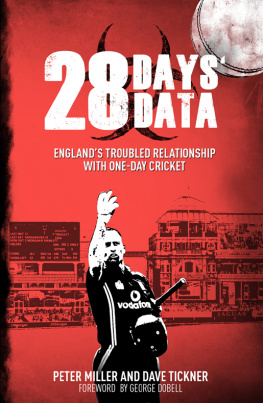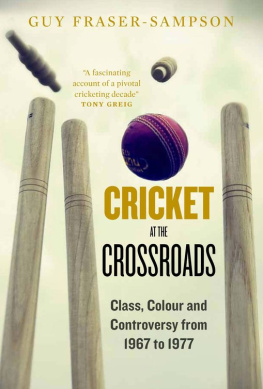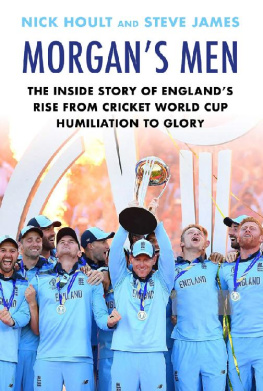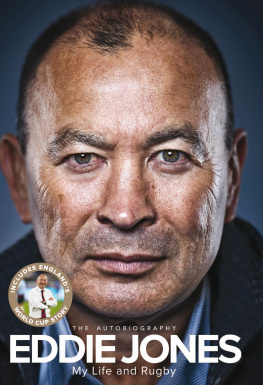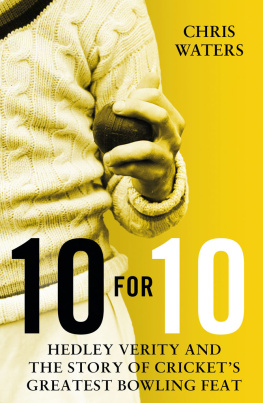First published by Pitch Publishing, 2016
Pitch Publishing
A2 Yeoman Gate
Yeoman Way
Durrington
BN13 3QZ
www.pitchpublishing.co.uk
Peter Miller and Dave Tickner, 2016
All rights reserved under International and Pan-American Copyright Conventions. By payment of the required fees, you have been granted the non-exclusive, non-transferable right to access and read the text of this e-book on-screen. No part of this text may be reproduced, transmitted, downloaded, decompiled, reverse-engineered, or stored in or introduced into any information storage and retrieval system, in any form or by any means, whether electronic or mechanical, now known or hereinafter invented, without the express written permission of the Publisher.
A CIP catalogue record is available for this book from the British Library
Print ISBN 978-1-78531-150-5
eBook ISBN: 978-1-78531-237-3
--
Ebook Conversion by www.eBookPartnership.com
Contents
Authors Note
T HE story of one-day cricket starts long before the focus of this book, but this is an attempt to understand why England went from almost winning the 1992 World Cup to consistent underachievers for the next two decades. We have tried to speak to as many of those who played for or coached England as possible, but it was difficult to speak to those who are still within the England set-up. Access is, perhaps understandably, closely guarded. We hope that we have been able to tell as accurate a version of events surrounding the most recent tournaments as possible. We are extremely grateful to all of those who took the time to speak to us on the record, and those that were able to fill in the gaps off the record. We could not have done this without them. When we have spoken to someone for the book we have tried to make it clear they are speaking directly to us by using the present tense says; quotes that we have collated from elsewhere are attributed to their original source. We would like to thank the following interviewees for sparing the time to speak to us: Jonathan Agnew, Mike Atherton, Lawrence Booth, Ali Brown, Robert Croft, Phil DeFreitas, Mark Ealham, John Etheridge, Angus Fraser, David Fulton, Ashley Giles, Graham Gooch, Adam Hollioake, Nick Hoult, Nasser Hussain, Raymond Illingworth, Steve James, Nick Knight, Andrew Miller, Lord MacLaurin, Peter Moores, Alan Mullally, Paul Nixon, Kevin OBrien, Kevin Pietersen, Derek Pringle, Jack Russell, Owais Shah, Neil Smith, Alec Stewart, Andrew Strauss, and Graham Thorpe.
Thank you to Pitch Publishing for agreeing to let us tell an unloved story. We hope the chance you have taken is worth it.
Also, thanks to those of you who were a sounding board for ideas, and to proofreaders and transcribers. You know who you are and you know you are appreciated.
Foreword
By George Dobell, Senior Correspondent, ESPNCricinfo
A N optimist, they say, describes the glass as half-full. A pessimist describes it as half-empty. And a regular supporter of England at cricket World Cups expects the glass to fragment, explode and kill everyone in the near vicinity.
It is, psychologists would tell us, a conditioned response. Weve experienced so much disappointment associated with World Cups that we should, by now, consider it a success if the team arrive at the venue on the right day (beyond them in 2003, albeit with mitigating factors), sober (the 2007 tournament was like Woodstock; if you remember it, you probably werent there) and looking smart in their blazers (something they didnt manage until 1987).
So this book should probably come with a health warning. It will bring back memories of long-buried traumas. Theres the Wasim Akram spell in 1992, Andy Bichel beating England all on his own in 2003, Kevin OBrien producing an innings so incredible he should probably have worn a cape (2011), the day-night loss in Wellington that was completed before there was any need to turn on the lights (2015) and, maybe grimmest of all, the 1999 elimination that occurred before the events theme song was released. A theme song whose video suggested that only the insane attended cricket.
There are recurring themes in the catalogue of failures contained here. Most of all there is the prioritising of Test cricket to the detriment of the ODI side and the habit of abandoning long-held plans on the eve of the tournament. Invariably, England have gone into World Cups a bizarre mixture of the exhausted and the inexperienced.
For that reason, Englands debacle at the 2015 World Cup has a strong claim to be ranked the most disappointing performance of all. They had, you see, been extended every advantage heading into it. The Ashes had been moved we had three Ashes series within two years to ensure England could spend the whole winter of 2014/15 honing the relevant skills and, in eight months between August 18, 2014 and March 14, 2015, they played 23 matches in all formats and 22 of them were ODIs. Yet, having persevered with Alastair Cook long after the point when it became clear to most that he was in ODIs at least part of the problem rather than part of the solution, they then changed the identity of their opening bowler and No. 3 batsman on the eve of the tournament. In a format where role identity and familiarity is so important, it was a self-defeating move.
It might be tempting to conclude that England have always been hopeless at ODI cricket, but that would be simplistic. They have been, in their own conditions at least, the best in the world on several occasions and should have won the Champions Trophy in 2004 and 2013. It often seems to be the way that Englands successes are explained away but, in 2012, when they beat Australia 4-0 at home and Pakistan 4-0 away, they were rated the best ODI side in the world for a reason. Lets not forget that. Even after they lost the Champions Trophy Final in 2013, there was no reason to think that, with Graeme Swann, Jonathan Trott and Kevin Pietersen available, they would not challenge in the 2015 World Cup.
Peter Moores carried the can for that failure. And it is only right that the coach should take some of the responsibility. But he didnt inherit a handful of aces when he took the job about 12 months earlier. Instead, he took over a team in transition, an administration committed to a captain not worth his place in the side and found himself representing a board whose behaviour has left many supporters disillusioned. He became the focal point for their anger and the scapegoat for the failure. Lampooned for a phrase he didnt say and a method in which he didnt believe, he became more piata than coach. He wasnt the problem.
He may not have been the solution, either, though. It is true that results improved, in ODI cricket at least, once he left. But he wasnt the only departure. England also discarded several of their senior players all of whom had failed at the World Cup and instead embraced younger, fresher talent developed in the county game. Almost immediately, they started to enjoy better results.
There might be a lesson there.
For while some blame the standard of the ECBs domestic competitions for Englands failing in World Cups they argue that players are disadvantaged by developing in that environment it is not an argument that stands up to much scrutiny.
Consider Ian Bell, for example. Bell was chosen to open the batting in the World Cup in 2015. But he had not played a domestic T20 match between June 25, 2010 and August 23, 2014.

